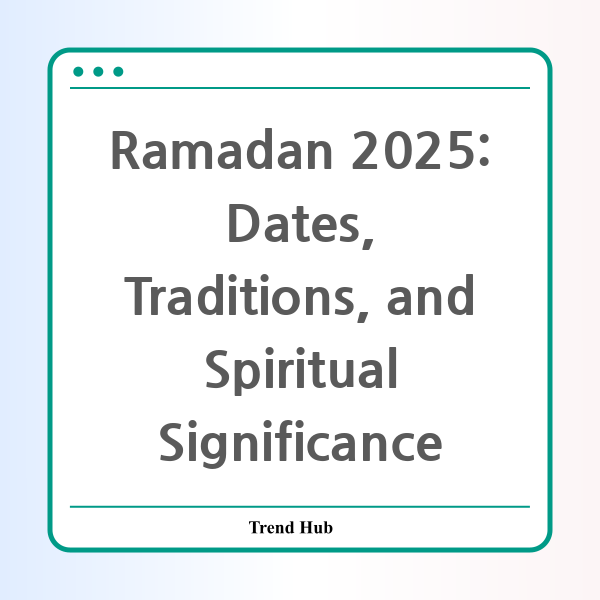* This website participates in the Amazon Affiliate Program and earns from qualifying purchases.

Ramadan 2025: An Overview
As the holy month of Ramadan approaches, thousands of Muslims around the globe prepare for a period of deep reflection, prayer, and community. For 2025, Ramadan is expected to commence on the evening of February 28 and conclude on the evening of March 30, culminating with the joyful celebration of Eid al-Fitr on March 31. This sacred time is marked by fasting from dawn to sunset, emphasizing spiritual purification and self-discipline.
What is Ramadan?
Ramadan is the ninth month of the Islamic lunar calendar and is one of the Five Pillars of Islam. It commemorates the Quran's revelation to Prophet Muhammad, making it a time of immense spiritual significance for Muslims worldwide. During this month, adherents engage in fasting (sawm), a practice that involves abstaining from food, drink, and other physical needs during daylight hours.
Key Dates and Observances
- Start of Ramadan: Evening of February 28, 2025
- End of Ramadan: Evening of March 30, 2025
- Eid al-Fitr: March 31, 2025
Because Ramadan follows the lunar calendar, its start and end dates shift each year, typically moving approximately 10 days earlier on the Gregorian calendar. The sighting of the crescent moon dictates the precise commencement of Ramadan, so it's important for Muslims to check with local authorities.
Fasting and Spiritual Practices
The fasting schedule during Ramadan involves two main meals:
- Suhoor: This pre-dawn meal is eaten before the Fajr (morning) prayer, providing energy for the day ahead.
- Iftar: The evening meal to break the fast, traditionally starting with dates and water, followed by a complete meal shared in community settings.
Throughout Ramadan, Muslims engage in additional prayers, including Taraweeh, and strive to read the entire Quran. Charitable acts, known as Zakat, increase during this month as well, reinforcing the community's commitment to support those in need.
Who is Required to Fast?
All healthy adult Muslims are obliged to fast. However, exemptions are provided for certain individuals:
- Children who have not reached puberty
- Pregnant or breastfeeding women if they may harm their health
- Individuals who are ill or have chronic conditions
- Travelers on long journeys, which could pose difficulty
- Women menstruating, who can make up the fast later
The Significance of Ramadan
Ramadan is considered a time for spiritual growth, self-restraint, and communal harmony. The Quran states: "The month of Ramadan is that in which was revealed the Quran; a guidance for mankind." This foundational scripture reinforces the importance of Ramadan as a month of guidance and self-reflection.
Additionally, many Muslims seek the Night of Power, Laylat al-Qadr, which falls within the last ten nights of Ramadan. This night is regarded as the holiest night of the year, where prayers and acts of devotion are believed to yield significant blessings.
Eid al-Fitr: The Festival of Breaking the Fast
At the conclusion of Ramadan, Muslims celebrate Eid al-Fitr with special prayers, communal feasting, exchanging gifts, and charitable giving known as Zakat al-Fitr. This festive occasion serves as a reminder of gratitude for the spiritual successes achieved during Ramadan and of the importance of community and togetherness.
Conclusion
As we approach Ramadan 2025, individuals and families worldwide look forward to this month of reflection and growth. From fasting to prayer and community outreach, Ramadan is a profound reminder of faith, unity, and the spirit of giving, culminating in the joyous celebration of Eid al-Fitr.
* This website participates in the Amazon Affiliate Program and earns from qualifying purchases.